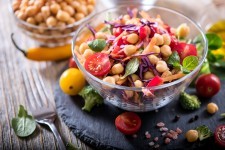Vegetarian diets for children and teens
With good planning, a vegetarian diet can be a healthy choice that meets your growing child’s nutritional needs. Talk to your health care provider or a registered dietician about your child's diet to make sure they are getting everything they need and growing well.
What is a vegetarian diet?
People eating a vegetarian diet do not eat the flesh of animals. In addition, different vegetarians include or exclude certain animal products as follows:
- Vegan: eats only non-animal foods (no dairy or eggs)
- Lacto-vegetarian: eats non-animal foods plus dairy (no eggs).
- Ovo-vegetarian: eats non-animal foods plus eggs (no dairy).
- Lacto-ovo vegetarian: eats non-animal foods plus eggs and dairy products.
- Pescetarian: eats non-animal foods plus fish
Are vegetarian diets safe for babies and children?
Well-planned vegetarian diets can support pregnancy, breastfeeding and growth during infancy and childhood. However, the safety of extremely restrictive diets such as fruitarian (a diet that consists entirely or primarily of fruits, and possibly nuts and seeds) and raw foods diets has not been studied in children.
Like any diet that doesn’t include certain foods, some vegetarian diets make it harder to get enough energy, protein, and certain nutrients. Some nutrients, like vitamin B12, are only found in animal sources. Iron, which is very important for babies and children, is more easily absorbed by the body when it comes from meat. So if your child’s diet doesn’t include animal foods, you’ll need to ensure these nutrients come from other sources. The chart at the bottom of this page may help.
Are vegetarian diets safe for teens?
Teens need a lot of energy and nutrients to get them through puberty. Be aware of your teen’s eating habits and help them eat the foods they need to stay healthy. If you think your teen isn’t eating well, speak to your health care provider or a registered dietitian.
What if my child follows a vegan diet?
Children following vegan diets may need a vitamin and mineral supplement, and additional calories. Please talk to your family doctor or dietitian to make sure your child is growing well and is getting the right type and amounts of nutrients.
How can vegetarian parents properly feed their baby?
Those who are pregnant or breastfeeding should speak to a registered dietitian to ensure they are getting enough vitamins and minerals as described in the chart below.
Exclusive breastfeeding provides adequate nutrition until 6 months of life. Babies who are exclusively breastfed (do not have a combination of breastmilk and formula) should get a supplement of vitamin D every day. Breastfeeding can continue for two years or longer.
Between 4 and 6 months of age, you should begin to introduce other foods to your baby. Vegetarian babies should get the same variety of iron-rich foods (including fortified cereals and beans), vegetables, and fruits as other babies. A vegetarian diet should contain a variety of foods high in omega-3 fatty acids and enough protein sources to meet your baby’s nutrition needs. Vegetarian sources of omega-3 include canola oil, soy products, walnuts and flax seed.
A healthy vegetarian diet should include:
| Energy (calories) | Vegetarian diets may have fewer calories than diets that include meat and dairy products. If your child is eating a well-balanced vegetarian diet, is gaining a healthy amount of weight and has lots of energy, then they are probably getting enough calories. Children eating a vegan diet might need extra sources of energy. Foods that are a high in energy include soy products, avocado, soy and canola oils, nuts and nut butters. | |
| Protein |
| |
| Fibre |
| |
| Minerals | Iron |
|
| Calcium |
| |
| Zinc |
| |
| Fat and fatty acids |
| |
| Vitamins | Vitamin D |
|
| Vitamin B12 |
| |
Reviewed by the following CPS committees
- Community Paediatrics Committee
Last updated: November 2024

